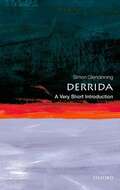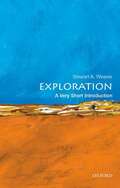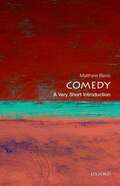Title search results
Showing 1 - 20 of 26 items

Scotland: a very short introduction (Very Short Introductions)
By Rab Houston. 2008
Professor of modern history examines Scotland's politics, laws, society, religious institutions, schools and universities, culture, and relationship with the world,…
including the factors that have distinguished it from England both before and after Union. 2008
Music: a very short introduction (Very Short Introductions)
By Nicholas Cook. 2000
Cambridge University professor of music proposes a framework for thinking about all kinds of music--world, folk, classical, jazz, rock, and…
pop--by examining the personal, social, commercial, and cultural values music embodies. Challenges the reader to learn to understand music in historical context and question received musicological thought. 1998
Dante: a very short introduction (Very Short Introductions)
By Peter Hainsworth, David Robey. 2015
Analysis of the Italian poet's major works focuses on the Divine Comedy, exploring its relevance to its own time and…
the ways it still speaks to modern readers. Considers Dante's use of allegory, his inventive language, and his insights into human nature. 2015
Corruption: a very short introduction (Very Short Introductions)
By Leslie Holmes. 2015
Explores corruption in government and business--starting with experts' disagreement over precisely what it is. Discusses cultural differences in what constitutes…
corrupt behavior; its social, legal, political, and economic impacts; systemic causes of corruption; and national and international efforts to fight it. 2015
Derrida: A Very Short Introduction (Very Short Introductions)
By Simon Glendinning. 2011
Academic shares insights into the thinking and writings of the philosopher labeled the father of deconstruction. Discusses positive and hostile…
reactions to his work. Addresses the problem of language in the history of Western metaphysics, thought-provoking ideas on ethics and politics, and the significance of the structure of writing. 2011.
Exploration: a very short Introduction (Very Short Introductions)
By Stewart Angas Weaver, Stewart A. Weaver. 2015
Analyzes the uniquely human compulsion to travel seeking discovery and adventure, and discusses the intrusive nature of activity that usually…
encouraged occupation, conquest, and control. Presents examples of acquisition and dissemination of new knowledge of earth's inhabitants, from earliest prehistoric human migrations to the latest polar and underwater explorations. 2015.
Dinosaurs: a very short introduction (Very Short Introductions)
By David Norman. 2005
Cambridge University paleobiologist summarizes what the fossil record tells us about the dinosaurs that roamed the planet more than sixty-five…
million years ago. Recounts nineteenth-century discoveries that provided a foundation for study, and recent developments that have challenged the traditional view of dinosaurs. 2005
Comedy: A Very Short Introduction (Very Short Introductions)
By Matthew Bevis. 2013
Scholar examines comedy, from the ancient Greeks to the present, through recurring elements and themes: the physical body, marriage, pain,…
the humdrum of existence, death. Discusses the idea that comedy and tragedy are not true opposites; comedy presupposes rather than precludes tragedy. 2013.
Adolescence: a very short introduction (Very Short Introductions)
By Peter K. Smith. 2016
Overview of the physical, intellectual, emotional, and social changes that children go through between puberty and adulthood. Includes discussion of…
parent-child and peer-group relationships, the development of identity, risk-taking and antisocial behavior, and sexual activity. 2016
Dreaming: a very short introduction (Very Short Introductions)
By J. Allan Hobson. 2005
Psychiatrist demystifies dreaming, describing the paradigm shift from content and Freudian psychoanalysis to the study of characteristics distinguishing dreaming from…
waking. Discusses neurobiological discoveries made possible by brain imaging technology, allowing brain- in-action observation, and showing that waking and dreaming are two states of consciousness determined by brain chemistry. 2002
Sociology: a very short introduction (Very Short Introductions)
By Steve Bruce. 1999
Professor of sociology asserts the value of his discipline for understanding the modern world. Draws on studies of social class,…
crime and deviance, work in bureaucracies, and changes in religious and political organizations. Explores the tension between the individual's role in society and society's role in shaping the individual. 1999
Sleep: a very short introduction (Very Short Introductions)
By Russell G. Foster, Steven W. Lockley. 2012
Two neuroscientists survey the modern-day science of sleep. They define sleep; explain why we need it, how much is optimal,…
and what happens when we don't get enough; look at major sleep disorders; and consider the impact of our modern twenty-four-hour society on our sleep and its patterns. 2012
Sport: a very short introduction (Very Short Introductions)
By Mike Cronin. 2014
Scholar charts the history of sports, from ancient games and traditional medieval pursuits such as folk football and cock fighting…
to the big business of professional sports today. Looks at the variety of team and individual sports. Explores the relationship between sports and class, gender, commerce, identity, and ethics. 2014
Slang: a very short introduction (Very Short Introductions)
By Jonathon Green. 2016
Noted lexicographer provides a wide-ranging survey of this subset of standard English. Green ponders the obscure origins of the word…
"slang" itself, classifies themes and objects to which most slang adverts, and presents a history of slang's many dictionaries. Offers examples, from Shakespeare and Dickens to the digital revolution. 2016
Sociolinguistics: a very short introduction (Very Short Introductions)
By John Edwards. 2013
Psychology professor describes the discipline that studies language in its social and cultural contexts--how words and sentences are influenced by…
our social environment. Discusses the importance of accents and dialects, the significance of names, the relationship between language and gender, the language of poverty, and the intertwining of language and religion. 2013
Theatre: a very short introduction (Very Short Introductions)
By Marvin Carlson. 2014
Professor of comparative literature offers a broad overview of the evolution and varieties of theatrical performance, from origins in ancient…
Egypt, Greece, and Rome; to classical India and China; to medieval England and Japan; and to contemporary America and Europe. Explores complex association of dramatic performance and religion. 2014
Terrorism: a very short introduction (Very Short Introductions)
By Charles Townshend. 2011
Professor of international history examines the historical, ideological, and regional roots of terrorist violence. Explores terrorism in relation to revolutionary…
power, nationalism, and religious extremism and considers the successes of specific terrorist and antiterrorist campaigns recently and in the distant past. Discusses debates about the erosion of civil liberties. 2011
Spirituality: a very short introduction (Very Short Introductions)
By Philip Sheldrake. 2012
Scholar and writer looks at the historical foundations of spirituality in the major world religions. Explores the concept of spiritual…
experience and considers its meaning, transformative power, and the impact it has on society. Contrasts spirituality and religion and considers spirituality in philosophy, anthropology, and psychology. 2012
Theology: a very short introduction (Very Short Introductions)
By David Ford. 2013
Professor of divinity surveys the central questions of theology, addressing believers and nonbelievers alike. Considers the principles underlying religious belief,…
such as the centrality of salvation to most major religions; the concept of God in ancient, modern, and postmodern contexts; and the issue of sin and evil. 2013
Rivers: a very short introduction (Very Short Introductions)
By Nick Middleton. 2012
Geographer offers a synthesis of the extraordinarily important part played by rivers in human history and culture. Examples--including the Amazon,…
the Danube, the Ganges, and the Mississippi--are provided from every continent. Explores the science of river flow and flood control, rivers in mythology and literature, and rivers' role in commerce. 2012